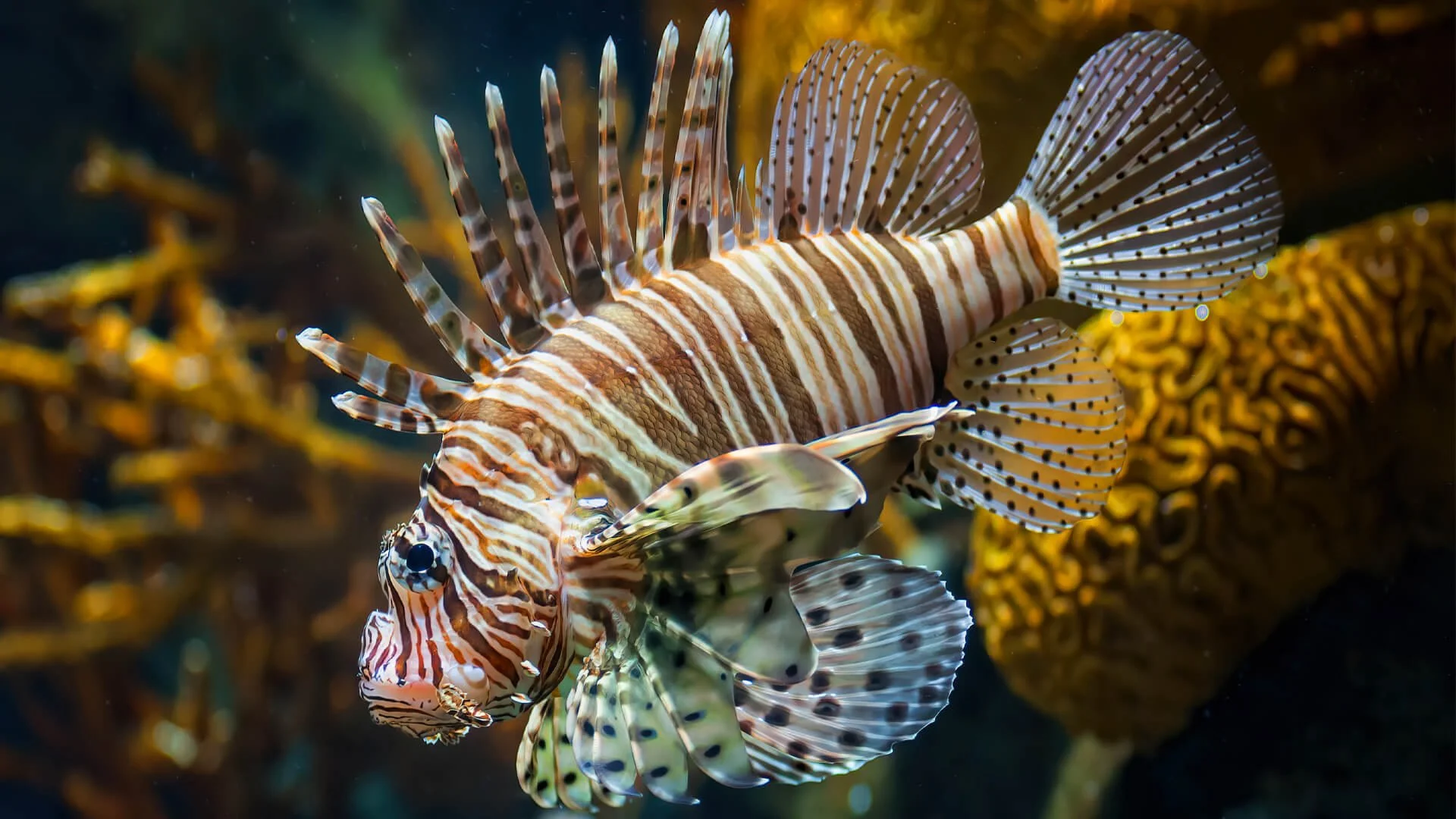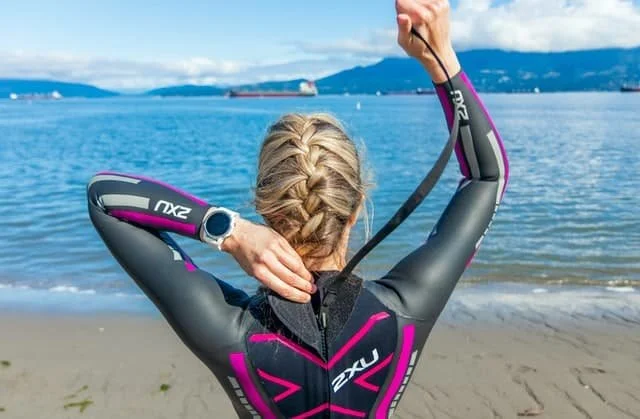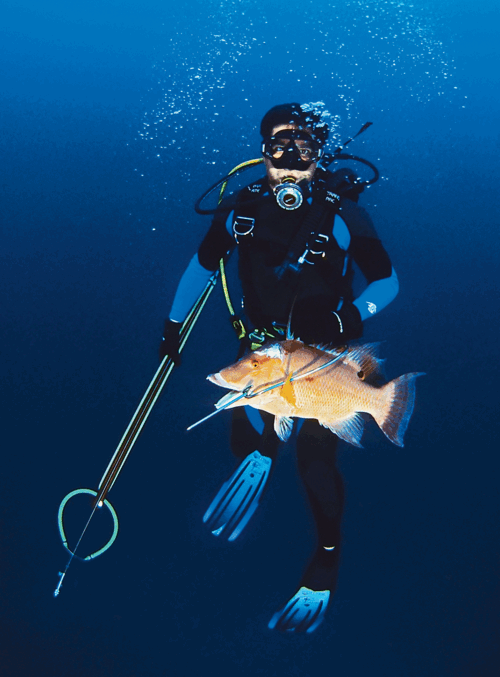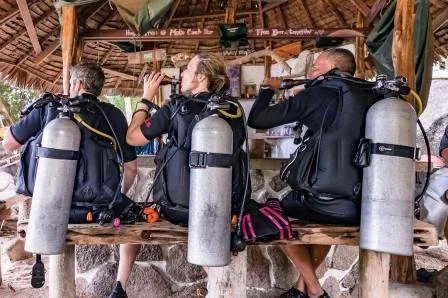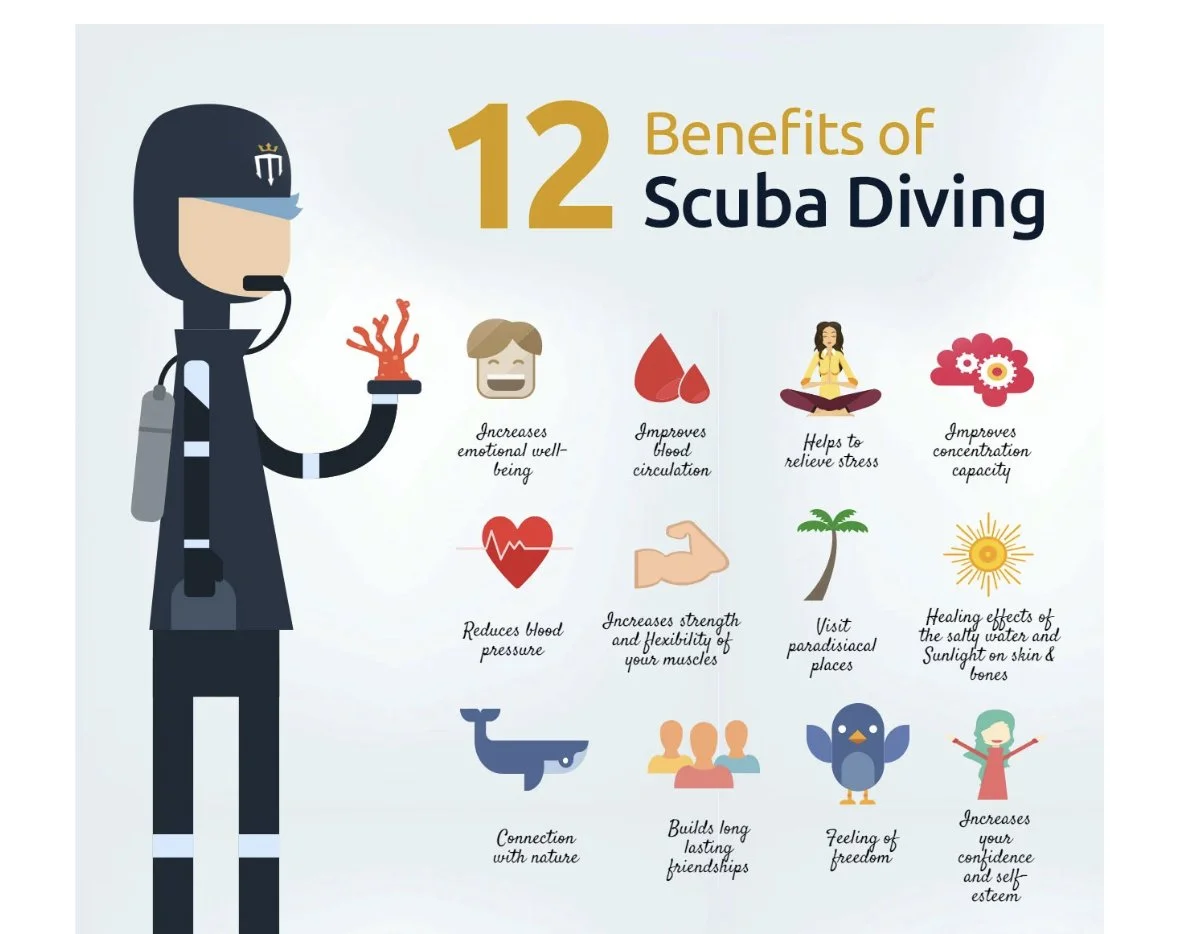Why Hunt Lionfish?
Lionfish are not popular in the sense of being admired or sought after by most people. However, they have gained attention and recognition for several reasons:
Invasive Species: Lionfish are not native to the waters of the Caribbean and Western Atlantic Ocean. They were introduced by human activities, likely through the aquarium trade, and have become invasive in these regions. As an invasive species, lionfish have a negative impact on native ecosystems, as they have no natural predators and can outcompete native fish for food and habitat.
Beautiful and Exotic Appearance: Lionfish are visually striking with their vibrant colors, long spines, and unique patterns. Their appearance has caught the attention of divers, photographers, and aquarium enthusiasts. They are often admired for their beauty and are sought after as subjects for underwater photography.
Unique Hunting Behavior: Lionfish are ambush predators and have a unique hunting style. They use their elaborate pectoral fins to corner and trap smaller fish, and their venomous spines to immobilize prey. Their hunting behavior, combined with their distinctive appearance, has fascinated many people.
Culinary Delicacy: Despite being invasive, lionfish are edible and considered a culinary delicacy in some regions. The white, flaky flesh of the lionfish is said to be delicious when properly prepared. Efforts have been made to promote lionfish as a sustainable seafood option and to encourage its consumption as a way to control their population.
Conservation Efforts: Due to the negative impacts of lionfish on native marine ecosystems, there have been concerted efforts to control their population through various means. This has included spearfishing derbies, lionfish culling initiatives, and encouraging the public to participate in removing lionfish from the waters. These conservation efforts have raised awareness about the lionfish invasion and the importance of protecting native marine life.
While lionfish are not popular in a positive sense, they have gained attention and interest due to their invasive nature, striking appearance, unique hunting behavior, culinary value, and the conservation efforts aimed at controlling their population. It is important to address the lionfish invasion through proper management strategies to mitigate their negative impact on native marine ecosystems.
How To Select A Wetsuit
Selecting the right wetsuit is important to ensure comfort, proper insulation, and flexibility during your dives. Here are some factors to consider when choosing a wetsuit:
Thickness: Wetsuits come in different thicknesses, typically measured in millimeters. The thickness you choose depends on the water temperature and your personal preference. Thicker wetsuits provide more insulation and are suitable for colder waters, while thinner wetsuits are more appropriate for warmer conditions. Consider the average water temperature of your dive locations and select a wetsuit that provides adequate thermal protection.
Fit: A proper fit is crucial for comfort and functionality. A wetsuit should fit snugly but not be overly tight or restrictive. It should allow for easy movement and not impede your range of motion. Check the manufacturer's sizing chart and try on different sizes to find the one that fits you best. Pay attention to the length, sleeve and leg openings, and ensure a good seal around the neck, wrists, and ankles to minimize water entry.
Material: Wetsuits are typically made from neoprene, a synthetic rubber that provides insulation and flexibility. Consider the quality and stretchiness of the neoprene when choosing a wetsuit. Higher-quality neoprene tends to be more durable, flexible, and better at retaining heat. Look for well-known brands that offer reliable and trusted neoprene materials.
Style: Wetsuits come in different styles, including full suits, shorties, and two-piece suits (separate tops and bottoms). The style you choose depends on your diving preferences and the water temperature. Full suits provide full-body coverage and are suitable for colder waters, while shorties or two-piece suits offer less coverage and are better for warmer conditions or tropical diving.
Entry System: Wetsuits have different entry systems, such as back zippers, front zippers, or no zippers (pullover). Consider the ease of putting on and taking off the wetsuit when selecting an entry system. Back zippers are common and easy to use, while front zippers or pullover designs provide a sleeker look and may be more suitable for certain water activities.
Brand and Quality: Choose wetsuits from reputable brands known for their quality and durability. Research customer reviews and consider recommendations from experienced divers. Investing in a high-quality wetsuit may provide better insulation, comfort, and longevity.
Try Before You Buy: Whenever possible, try on a wetsuit before making a purchase. This allows you to assess the fit, comfort, and flexibility of the suit. Many dive shops have wetsuits available for rental, which gives you an opportunity to test different styles and sizes before deciding on the one that suits you best.
Remember that wetsuits can vary between brands and individual preferences, so what works for one person may not work for another. Take the time to find a wetsuit that fits you well, provides adequate thermal protection, and allows for comfortable movement during your dives.
How To Become A Good Underwater Hunter?
Becoming a good underwater hunter requires a combination of skills, experience, and knowledge. Here are some steps you can take to improve your underwater hunting abilities:
Obtain Proper Training and Certification: Before engaging in underwater hunting, it is essential to become a certified scuba diver. Enroll in a reputable dive training program that includes courses specific to hunting, such as a spearfishing or underwater hunting specialty course. These courses will teach you important techniques, safety procedures, and ethical considerations specific to underwater hunting.
Master Diving Skills: Develop strong foundational diving skills, including buoyancy control, navigation, and underwater communication. These skills are crucial for safe and successful hunting. Practice regularly to become comfortable and proficient in your diving abilities.
Learn About Marine Life: Study the behaviors, habits, and habitats of the marine species you intend to hunt. Understand the local regulations regarding hunting and protected species. Learn to identify different species and their specific hunting restrictions or seasons.
Improve Freediving Skills: Underwater hunting often involves freediving, which is diving without the use of scuba equipment. Work on improving your breath-holding abilities, relaxation techniques, and underwater swimming techniques. Consider taking freediving courses to learn proper breath-holding techniques, equalization methods, and safety protocols.
Use Appropriate Equipment: Invest in quality underwater hunting equipment, such as a speargun, polespear, or Hawaiian sling, depending on your preference and local regulations. Ensure your equipment is well-maintained, properly calibrated, and suitable for the hunting conditions you will encounter.
Practice Target Shooting: Regularly practice target shooting with your chosen hunting equipment. This will help improve your accuracy and aim. Set up targets underwater or participate in target shooting competitions to challenge and refine your skills.
Dive with Experienced Hunters: Dive with experienced underwater hunters to learn from their techniques, observe their approaches, and gain insights into successful hunting strategies. Observe how they stalk their prey, approach their targets, and execute clean and ethical kills.
Respect the Environment: As an underwater hunter, it is essential to respect the marine environment and follow sustainable hunting practices. Abide by local regulations, adhere to size and bag limits, and avoid hunting endangered or protected species. Remember to only take what you intend to consume and leave the rest of the ecosystem undisturbed.
Dive Safely: Prioritize safety during your hunting dives. Dive with a buddy, communicate effectively, and follow proper safety procedures. Be aware of your limits, monitor your air supply and dive time, and always dive within your training and experience level.
Continual Learning and Improvement: Underwater hunting is a skill that develops over time and with experience. Continue to learn, practice, and improve your hunting techniques. Seek feedback, reflect on your dives, and adapt your approach based on your experiences.
Remember that ethical hunting practices, safety, and conservation should always be paramount when engaging in underwater hunting. Respect the marine environment, promote sustainable practices, and enjoy the thrill and challenges of underwater hunting responsibly.
Divers Are Happier, More Intelligent & Better Travelled – Here’s Why
We’ve seen 70% more of the world than you – a world you don’t even know exists, animals that you’ll never see outside of water. We are scuba divers, and here’s why our lives are richer than those that don’t dive. How much longer are you going to miss out for?
Scuba Divers are fitter and healthier
Oh yes we are. First of all let’s talk about how exercising in water is very effective due to the natural resistance water has against our bodies. Using your legs to fin at depth is great exercise and the sensation of being weightless makes it feel almost effortless. It has been scientifically substantiated that any form of exercise improves cardio-vascular performance and that translates into a reduced risk of heart attacks, strokes, circulatory problems and ailments in general. BOOM.
Then there’s the added benefit of the sun, that usually pokes its head out in most dive destinations we are travelling to. The Vitamin D from the sun not only helps the rate of absorption of calcium, it also helps the cells pass calcium to each other. This higher absorption rate helps to keep the bones healthy and strong. Exposure to sunlight also helps to increase endorphin production within our brains.
They live in a Real Life ‘Finding Nemo’ Movie
Can you believe they made two whole movies about finding nemo when we get to find him every day? They should have come to the scuba divers first, we could have told them exactly where he was.
The life of a scuba diver is one of dodging turtles, marvelling at fish and watching as sharks glide by. The pure pleasure, wonder, and awe of interacting with, and being up close to, amazing marine life produces an incredible feeling of increased well-being, not to mention how damn cool it is swimming in a real life fish tank. You just can’t do that sort of stuff on dry land!
Summer Diving at Blue Heron Bridge
Summer diving at Blue Heron Bridge in West Palm Beach, Florida, can offer unique and exciting opportunities for divers. Here's what you can expect:
Marine Life: Blue Heron Bridge is known for its rich biodiversity and excellent opportunities for macro photography. During the summer months, you can encounter a variety of marine species such as seahorses, pipefish, frogfish, octopuses, nudibranchs, and colorful juvenile tropical fish. Keep an eye out for various critters and camouflaged creatures hiding among the mangroves and sea grass.
Warm Water and Visibility: In the summer, water temperatures in West Palm Beach can range from the mid-80s Fahrenheit (around 29°C) to the low 90s Fahrenheit (around 32°C). This means you won't need thick wetsuits or drysuits and can enjoy comfortable dives in warmer waters. Visibility can vary but is generally around 40 to 80 feet (12 to 24 meters) or more, providing good visibility for underwater exploration and photography.
Tides and Currents: Blue Heron Bridge experiences tidal changes, which can influence dive conditions. It's important to plan your dives according to the tides to maximize your chances of optimal visibility and minimize the effects of strong currents. You can check tide charts or consult with local dive operators for the best dive times.
Night Diving: Summer nights can be a great time for night diving at Blue Heron Bridge. Underwater, you can witness nocturnal marine life and observe creatures that are not typically visible during daylight dives. Night dives offer a unique perspective and can be a thrilling experience.
We do dive Training and Certification: Blue Heron Bridge offers a range of diving experiences suitable for divers of different skill levels. However, some dives, particularly at deeper depths or during stronger currents, may require more advanced certifications. Make sure to assess your skill level and select dives that align with your training and experience.
Remember to dive safely, adhere to local regulations, and respect the marine environment. Blue Heron Bridge is a popular dive site, so be mindful of other divers and practice good buoyancy control to avoid damaging the delicate marine ecosystem. Enjoy the beauty and diversity of the underwater world at Blue Heron Bridge during your summer dives!
DIVE WEST PALM BEACH
West Palm Beach, located in Florida, is known for its vibrant diving scene and beautiful underwater ecosystems. Here's some information about diving in West Palm Beach:
Dive Sites: West Palm Beach offers a variety of dive sites suitable for divers of different skill levels. Some popular dive sites include:
- Blue Heron Bridge: Known as one of the best shore dives in the United States, Blue Heron Bridge is a favorite among macro photographers. This site offers an abundance of marine life, including seahorses, pipefish, octopuses, and various colorful critters.
- Breakers Reef: Located just off Palm Beach, Breakers Reef is a shallow reef system teeming with marine life. Divers can explore colorful corals, encounter tropical fish, and occasionally spot larger marine species like sea turtles and nurse sharks.
- The Mizpah: This artificial reef is a sunken cargo ship that now serves as a thriving marine habitat. Divers can explore the wreckage, which is home to a variety of fish, eels, and other marine creatures.
Water Conditions: West Palm Beach benefits from warm waters and relatively good visibility throughout the year. Water temperatures range from the mid-70s Fahrenheit (around 24°C) in winter to the mid-80s Fahrenheit (around 29°C) in summer. Visibility can vary but is often between 40 to 80 feet (12 to 24 meters).
Dive Operators and Services: There are several dive operators in the area that offer guided dives, equipment rental, and scuba training. It's recommended to research and choose a reputable dive operator with experienced instructors who can provide a safe and enjoyable diving experience.
Marine Life: West Palm Beach is home to diverse marine life, including colorful tropical fish, turtles, rays, eels, and various species of corals and sponges. The area is also known for seasonal visits from gentle giants like manatees and occasional encounters with sharks.
Other Activities: West Palm Beach offers a range of activities for non-divers as well. Visitors can enjoy beautiful beaches, explore nature parks, go fishing, or visit cultural attractions in the area.
Remember to dive within your training and experience limits, follow local regulations, and respect the marine environment. It's always advisable to check with local dive operators for current conditions, dive site access, and any specific requirements or recommendations before planning your diving trip to West Palm Beach.
Come book a private charter with 365 SCUBA.
DIVING NAKED
Scuba diving naked is generally not recommended due to several safety and practical considerations. Here are a few reasons why:
365 SCUBA Does Do an Annual Dive The Nude Charter.
1. Exposure and Hypothermia: Scuba diving often takes place in water that can be colder than body temperature. Exposing your body to cold water without proper thermal protection, such as a wetsuit or drysuit, increases the risk of hypothermia. Hypothermia can lead to loss of coordination, impaired judgment, and potentially life-threatening situations underwater.
2. Physical Protection: Wearing a wetsuit or drysuit provides physical protection against abrasions, stings, and potential injuries from marine life, rocks, or sharp objects. Being exposed without any protective gear puts you at greater risk of cuts, scrapes, and potential contact with hazardous marine organisms.
3. Buoyancy Control: Wetsuits and drysuits are designed to provide buoyancy and help with maintaining neutral buoyancy underwater. Without proper exposure protection, it can be challenging to achieve and maintain buoyancy control, which is a crucial skill for safe and comfortable diving.
4. Respect for the Environment: When diving, it is important to respect the marine environment and the creatures that inhabit it. Wearing a wetsuit or drysuit can help minimize any potential impact on marine life, such as accidental contact or disturbance.
5. Safety and Professionalism: Most reputable dive operators and training organizations have specific guidelines and regulations regarding appropriate dive attire. It is essential to adhere to these guidelines to ensure safety, maintain professionalism, and uphold diving standards.
If you are considering diving without a wetsuit or drysuit due to personal preferences or specific circumstances, it is crucial to assess the risks and consult with experienced divers or professionals familiar with the dive site and conditions. They can provide guidance based on local regulations, water temperatures, and safety considerations.
Remember, safety should always be the top priority when engaging in scuba diving activities. Properly fitted exposure protection and following established diving practices will help ensure a safer and more enjoyable diving experience.
DO YOU PEE IN A WETSUIT?
If you choose to pee in a wetsuit, it's important to be aware of the potential hygiene and maintenance issues associated with it. While it may be a personal decision, here are a few tips to consider:
1. Clean and Rinse: After each dive, thoroughly rinse your wetsuit with freshwater to remove any urine residue. This helps minimize odors and prevents bacteria growth. You can also use a wetsuit cleaner or mild detergent to clean the suit regularly.
2. Proper Storage: Allow your wetsuit to dry completely before storing it. Hang it in a well-ventilated area out of direct sunlight. Avoid storing it in a damp or enclosed space, as this can promote bacterial growth and odors.
3. Use a Pee Valve: Some drysuits have optional pee valves that allow divers to relieve themselves without urinating directly into the suit. These valves can be installed by a professional and provide a more convenient and hygienic solution.
4. Consider Thermal Layers: Wearing thermal layers underneath your wetsuit can help absorb and contain any urine, reducing direct contact with the neoprene. Thermal layers can be washed separately, making it easier to maintain hygiene.
5. Respect Others and Rental Gear: If you are diving with others or using rental gear, be mindful of the potential impact on others. Rental gear may be used by multiple individuals, and urinating in a wetsuit can create discomfort or hygiene concerns for others.
Remember, maintaining hygiene, respecting others, and adhering to proper diving practices are crucial aspects of scuba diving. While peeing in a wetsuit may be a personal choice, it's important to understand the potential consequences and take appropriate measures to minimize any negative impact on the suit, yourself, and others.
Family Vacation Travel Tips for Scuba Divers
Planning a family vacation that incorporates scuba diving can be a wonderful experience. Here are some travel tips to consider when organizing a family trip that includes scuba diving:
1. Choose a family-friendly destination: Look for destinations that cater to both divers and non-divers, offering a variety of activities and attractions for everyone in the family. Some popular family-friendly diving destinations include the Caribbean, Hawaii, the Maldives, and the Great Barrier Reef in Australia.
2. Consider the skill levels and interests of family members: Ensure that the dive sites and dive operators in the chosen destination cater to divers of different skill levels, including beginners and children. Some locations may have calmer, shallow dive sites suitable for novice divers, while others may offer more advanced sites for experienced divers.
3. Opt for a dive resort or liveaboard: Consider staying at a dive resort or booking a liveaboard trip that provides accommodations and diving services in one package. This can simplify logistics and provide a convenient diving experience for the whole family. Dive resorts often offer amenities and activities for non-diving family members as well.
4. Plan non-diving activities: While diving may be the primary focus of the trip, plan activities that non-diving family members can enjoy during the dive days. This can include snorkeling, beach outings, sightseeing, water sports, or cultural experiences. It's important to have a balance between diving and family activities to ensure everyone has a memorable vacation.
5. Ensure safety and proper training: Make sure that all family members who plan to dive have the necessary certifications and proper training. If any family members are not certified divers, consider enrolling them in a beginner's scuba diving course before the trip. It's essential to prioritize safety and adhere to all diving guidelines and regulations.
6. Pack necessary equipment: Depending on the destination and the dive operator's policies, you may need to bring some of your own scuba gear or rent it on-site. Check in advance what equipment is available and plan accordingly. Don't forget to pack other essentials such as swimsuits, rash guards, sunscreen, and underwater cameras for capturing memorable moments.
7. Coordinate schedules and logistics: Plan your diving activities and schedules in advance, taking into account factors such as dive times, surface intervals, and rest days. Coordinate with dive operators to ensure smooth logistics and avoid any conflicts with family activities or excursions.
Remember to check travel advisories, local regulations, and COVID-19 restrictions for your chosen destination. Planning ahead and ensuring everyone's safety and enjoyment will contribute to a fantastic family vacation with scuba diving at its heart.
Call 365 Scuba they can set up your trip!
PADI ARE THEY THE BEST?
PADI (Professional Association of Diving Instructors) is one of the largest and most well-known scuba diving training organizations worldwide. It offers a comprehensive range of scuba diving courses and certifications, and many divers have had positive experiences with PADI training.
However, whether PADI is the "best" diving organization is subjective and can depend on various factors, including personal preferences, location, and individual experiences. Here are a few points to consider:
Reputation and Recognition: PADI is widely recognized and respected within the diving community. Its certifications are accepted globally, making it easier to continue diving and receive recognition for your training in various dive centers and destinations.
Course Offerings: PADI provides a diverse range of courses for beginners to professional-level divers. Whether you're just starting or seeking advanced certifications, PADI offers a comprehensive curriculum to meet various diving goals.
Instructor Network: PADI has a large network of certified instructors worldwide, increasing the chances of finding a PADI professional wherever you plan to dive. However, the quality of instruction can vary depending on the individual instructor's experience and teaching style.
Diving Community: PADI has a vast and active diving community, which can offer opportunities for networking, dive trips, and sharing experiences with fellow divers.
That being said, other scuba diving organizations like SSI (Scuba Schools International), NAUI (National Association of Underwater Instructors), and SDI (Scuba Diving International) also provide reputable training programs and certifications. These organizations have their own strengths and may be preferred by some divers based on location, personal recommendations, or specific course offerings.
Ultimately, the "best" organization for you depends on your individual needs, preferences, and the quality of training available in your area. It's always recommended to do research, read reviews, and talk to experienced divers to gather more information before selecting a diving organization or training facility.
DRINKING & DIVING
Scuba diving and drinking alcohol do not mix and can be extremely dangerous. It is strongly advised to avoid consuming alcohol before or during scuba diving activities. Here's why:
1. Impaired judgment and coordination: Alcohol impairs your cognitive abilities, coordination, and decision-making skills. Scuba diving requires focus, concentration, and quick reactions, which are compromised under the influence of alcohol. Impaired judgment can lead to poor decision-making underwater, increasing the risk of accidents and injuries.
2. Dehydration and increased decompression risk: Alcohol is a diuretic, meaning it promotes fluid loss from your body. Scuba diving already dehydrates your body due to breathing dry air and the exertion involved. Combining alcohol-induced dehydration with the dehydrating effects of diving can lead to an increased risk of decompression sickness (the bends).
3. Masking symptoms and delayed response: Alcohol can mask symptoms such as fatigue, dizziness, and nitrogen narcosis that are important indicators of potential problems while diving. This can prevent you from recognizing and responding to dangerous situations in a timely manner.
4. Increased nitrogen absorption: Alcohol can increase the absorption of nitrogen into your tissues, making you more susceptible to nitrogen narcosis and decompression sickness. These conditions can impair your judgment and potentially lead to life-threatening situations underwater.
5. Increased risk of accidents: Alcohol impairs motor skills, balance, and reaction time. This increases the risk of accidents, such as entanglement, gear malfunctions, or inability to respond effectively to emergencies.
It is essential to prioritize safety when scuba diving. If you plan to dive, it is strongly recommended to abstain from consuming alcohol for a significant period before your dive, typically at least 24 hours in accordance with recognized diving safety guidelines. Always follow the guidelines set by your dive training organization and ensure you are in a fit and sober state to dive.
BEST TO JUST NOT DRINK & DIVE
DIVING TIRED
If you are feeling tired during a scuba diving session, it's important to take immediate action to ensure your safety. Here are some steps you can follow:
1. Signal your buddy or dive leader: Use underwater hand signals or other prearranged communication methods to let your buddy or dive leader know that you are feeling tired. This will ensure that they are aware of your condition and can provide assistance if needed.
2. Ascend to a shallower depth: If you are feeling fatigued or tired, it's generally recommended to ascend to a shallower depth where the pressure is lower. Ascending to a shallower depth can help alleviate some of the physical strain caused by the depth and reduce the risk of complications.
3. Perform a safety stop: If you are at a depth that requires a safety stop during ascent, make sure to complete the stop as recommended by your dive training. The safety stop allows your body to off-gas excess nitrogen and helps prevent decompression sickness.
4. Rest and conserve energy: Once you reach the surface, find a safe and comfortable place to rest. Sit or lie down, remove any heavy equipment, and relax. Allow your body to recover and regain energy.
5. Hydrate and refuel: Drink water or other hydrating fluids to replenish your body's fluids. Additionally, have a light snack or meal to provide your body with energy. Avoid consuming alcohol or caffeine as they can dehydrate you further.
6. Assess your condition: Take a moment to evaluate how you feel. If you still feel excessively tired or fatigued, it may be best to skip further dives for the day or consider taking a break until you feel fully recovered.
It's crucial to listen to your body and prioritize your safety while diving. If you frequently experience fatigue or tiredness during dives, it may be necessary to consult with a medical professional or diving instructor to determine the underlying cause and address it appropriately.
CAN A WHALE SHARK EAT YOU?
No, you cannot get eaten by a whale shark. Whale sharks are filter feeders, meaning they primarily feed on plankton, small fish, and other microscopic organisms. They have a very large mouth, but their throat is relatively small, allowing them to only swallow small prey.
Whale sharks are docile and gentle creatures. They are known to be non-aggressive and pose no threat to humans. In fact, they are often considered one of the most harmless species of sharks. They are known for their slow swimming pace and are known to be curious and tolerant of divers.
While interactions with whale sharks can be an incredible and awe-inspiring experience, it is important to remember to maintain a respectful distance and avoid touching or interfering with the sharks. It is essential to practice responsible and eco-friendly diving and follow any guidelines or regulations provided by local authorities or dive operators when encountering whale sharks or any other marine animals.
HOW TO USE A SURFACE MARKER BUOY (SMB)?
Deploying a surface marker buoy (SMB) is a common practice in diving and maritime activities to signal your presence, mark a specific location, or indicate an ascent point. Here's a step-by-step guide on how to deploy a surface marker buoy:
1. Prepare the Surface Marker Buoy (SMB):
- Ensure the SMB is properly inflated. Most SMBs have an oral inflation valve or an inflator mechanism to fill them with air.
- Attach a spool or reel with a line to the SMB. The line should be long enough to reach the surface from the desired depth. A typical length is around 30 meters (100 feet).
2. Ascend to the Desired Depth:
- When you reach the depth at which you want to deploy the SMB, ensure you are neutrally buoyant and in a stable position.
3. Attach the Line to a Secure Point:
- Find a suitable secure point to attach the line. This could be a D-ring on your BCD (buoyancy control device), a secure rock formation, or any other stable underwater structure.
- Ensure the line is properly secured, allowing the SMB to ascend vertically without getting entangled.
4. Inflate and Release the SMB:
- Hold the SMB upright and release any trapped air or water inside.
- Using the oral inflation valve or the inflator mechanism, fill the SMB with air until it is fully inflated.
- If the SMB has an open bottom, hold it tightly closed until it is inflated to prevent air from escaping.
- Once the SMB is fully inflated, release it, allowing it to ascend to the surface. Hold on to the line as it rises.
5. Monitor the SMB's Ascent:
- As the SMB ascends, maintain tension on the line to ensure it rises vertically and doesn't drift away.
- Keep an eye on the SMB to ensure it reaches the surface without any issues or entanglements.
6. Signal Surface Support:
- Once the SMB reaches the surface, you can signal surface support by giving a series of tugs on the line.
- This notifies the boat or other divers that you have successfully deployed the SMB and are ready for pickup or that you're at the designated location.
Remember, it's essential to practice deploying an SMB in controlled conditions and follow any specific instructions provided by the manufacturer or your diving training organization. Safety should always be a priority, and proper training and experience are crucial for any underwater activity. 365 Scuba teaches a SMB class for free!
12 BENEFITS OF DIVING
12 Benefits of Diving
1. INCREASES EMOTIONAL WELL BEING
Arguably the most important benefit of scuba diving during a worldwide pandemic. Have you ever heard the theory that watching fish in an aquarium is incredibly relaxing? So imagine how calming it would be to actively observe the underwater environment while being in it physically from inside!
There is also evidence that the type of marine life observed can make a difference. Authors of the study suggest that we were more affected by images of colorful, tropical fish and higher levels of biodiversity.
Being underwater brings you back to feeling like you are in your mother’s womb, which increases the feelings of security, happiness and well-being. Moreover, having a calm mind helps achieving a positive mental attitude and reduces the feelings of depression.
2. IMPROVES BLOOD CIRCULATION
While being underwater, your body is exposed to a pressure gradient. All your body muscles are working simultaneously and require oxygen to do so, so your blood vessels open in order to bring that oxygen to the muscles.
3. HELPS TO RELIEVE STRESS
The breathing techniques we use while diving are similar to the ones we use whilst meditating.
Focusing on watching the underwater life distracts your mind from ‘day to day’ issues, so allowing your brain to forget about everything else for the duration of the dive.
This helps to enable our body and central nervous system to restore its natural balance.
4. IMPROVES CONCENTRATION CAPACITY
Being stuck in lock down and/or working from home, day in day out, can affect our concentration. One of the benefits of scuba diving can help us to really focus on our day to day tasks.
When diving, you have to simultaneously keep your balance while swimming and also pay close attention to your environment. As a result, your brain improves its concentration and awareness.
5. REDUCES BLOOD PRESSURE
The warming up of our body plus the slow and deep breaths used whilst diving, help to reduce our blood pressure. Many studies show that those who dive regularly are less likely to be prone to strokes and heart attacks.
6. INCREASES STRENGTH AND FLEXIBILITY OF YOUR MUSCLES
There’s been a lot of press lately about people working in home office spending longer at their desk than normal. Many are not taking regular breaks and stretching their legs.
Diving is a real physical fitness work out! All your different muscle areas tend to work more underwater due to the resistance of the water. So there’s no better time to shake of the shackles of your desk, jump in the water and give your tired body a good relaxed workout.
7. VISIT PARADISIACAL PLACES
When we can travel, most of the time we choose warm destinations for our diving holiday trips. With this come great new experiences and positive things for our body and mind!
Traveling is a part of a diver.
8. HEALING EFFECTS OF SALTY WATER AND SUN ON SKIN AND BONES
Seawater is particularly beneficial to the skin, increasing its elasticity and improving its outer appearance. At the same time, sunlight gives a boost to your vitamin D levels that are essential for the absorption of calcium in the bones to make them healthier and stronger.
Vitamin D does not only increase the rate of absorption of calcium, it also helps the cells pass calcium to each other. This higher absorption rate of calcium helps to keep the bones healthy and strong.
Exposure to sunlight also helps to increase endorphin production within our brains, which generates feelings of joy and happiness.
9. CONNECTION WITH NATURE
Diving brings you closer to nature, literally and figuratively speaking. Divers tend to appreciate nature more than non-divers would and are most excited to feel part of the underwater world.
Feeling this connection brings is back to our basic primal roots and helps us to forget what currently happening in the world around us.
10. BUILDS LONG LASTING FRIENDSHIPS
When you go diving, you will meet like-minded individuals who share a common passion and this make you feel being part of a community.
Whenever you are on a liveaboard or diving from shore, it is always easy to make friends and meet new people. With strict COVID-19 tests and regulations already in place, this is even possible during a global pandemic.
Moreover, diving promotes camaraderie, equality and empowerment.
11. FEELING OF FREEDOM
The feeling of being weightless and free from any physical or emotional impairment.
12. INCREASES YOUR CONFIDENCE AND SELF ESTEEM
Diving also improves our self-perception due to the fact that scuba diving happens in an environment that is different from ours – the sea – and being able to handle it makes you feel confident and fulfilled!


